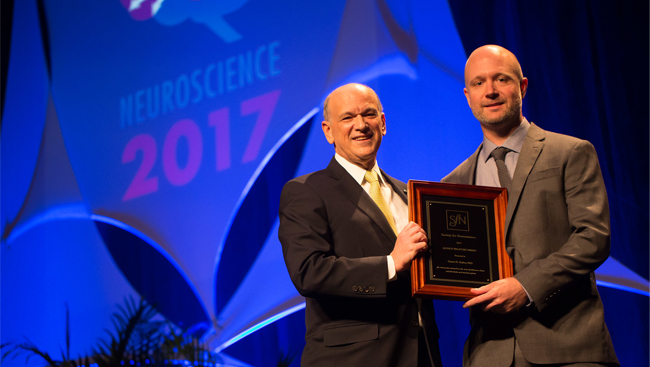
In the last seven years Garret Stuber, an associate professor at the University of North Carolina, has worked to characterize neural circuits underlying addiction, depression, and eating disorders. Through his use of optogenetics, his findings have contributed to a more foundational understanding of how drug addiction affects the brain, focusing on synaptic plasticity. For this work, he received the Jacob P. Waletzky Award in 2017.
What initially let you to study addiction, depression, and eating disorders?
Addiction, and neuropsychiatric disease in general, take a tremendous toll on society. These disorders are incredibly expensive from a public health perspective, and they likely — directly or indirectly — impact everyone to some extent.
People close to me have dealt with addiction and mental illness, which has driven me to dedicate my career to better understanding the neurobiology of addiction and reward and, more broadly, of motivated behavior.
I’ve been focused on this since I was an undergraduate and to this day I’m still extremely passionate about this research.
What discoveries or new insights from your work have been particularly exciting for you and why?
Something continuously exciting throughout my career is figuring out how we can leverage innovative technologies and tools to gain new and fundamental insights into brain function, particularly around mental health and addiction.
When I was in graduate school, I started working on techniques to measure rapid fluctuations in dopamine. At the time, these techniques were just starting to emerge, but we were able to apply these tools to understand how the release of this neurotransmitter occurs with respect to ongoing behaviors, such as those related to addiction.
More recently, I've been excited about our ability to identify critical neurocircuit nodes, or cell types, and their properties to see how a given cell type, or connection between them, can orchestrate animal behavior.
We're still only scratching the surface of our understanding of how neurocircuits orchestrate behavior, so I’m optimistic about the future of this work.
How have optogenetics influenced how you approached your research?
Optogenetics without a doubt completely transformed my perspective on systems neuroscience. These tools enable a high degree of precision so we can manipulate neuroactivity and monitor and study the encoding properties of cells in the context of behavior.
Before optogenetics and other recent neuroactivity imaging approaches, we had a pretty good understanding of the anatomical substrates in the brain important for driving behavior, but we weren’t able to move beyond that.
Optogenetics was one of the first tools that began to catalyze this research and enable us to understand how precise cell types, connections between cells, and neurocircuits can orchestrate behavior.
Looking forward, what are some ways advancements with optogenetics or other techniques could impact scientific discovery?
I'm optimistic about approaches that try to understand and survey molecularly distinct cell types within any given brain region.
This relies on a suite of approaches, such as single-cell transcriptional profiling, where you look at messenger RNAs expressed in thousands of neurons taken from brain tissue, combined with another approach that traces neuroconnections between genetically defined cell types.
That’s really exciting to me because they're essentially providing a rational strategy for understanding and cataloging cell types, as well as investigating their function and encoding properties.
With that information, we'll be able to use optogenetics, single-cell imaging approaches, and electrophysiology to get a much more detailed understanding of the neurosubstrates critical for different behaviors.
What are some of the current challenges and next questions you're working to solve?
Right now, we're invested in understanding the cell types within the ventral tegmental area, different regions of the hypothalamus, the basal forebrain, and others, and we’re getting some preliminary results. This inquiry will allow us to delineate the types of neurons that exist in these brain regions in a nonbiased way.
Then we should be able to understand how those cell types are changing or adapting to adaptive and maladaptive stimuli. For example, we can survey the variety of cell types in a brain region and get a fundamental understanding of them, but then look at how an in vivo treatment, such as drug exposure, is differentially impacting the various cell types.
We could even take it a step further and try to understand how the activity within neurocircuits relates to the gene expression or molecular profiles of those cells. There needs to be a comprehensive understanding of how molecularly defined neurons relate to activity patterns and ultimately drive behavior. One of the major challenges right now is that this technology is still developing. But it’s becoming more routine and will continue to advance.
Another challenge is how to deal with the data from these approaches. We end up with hundreds of gigabytes — or more — of data from every experiment, and it's up to the investigators to make sense of it. But the computational tools and analytical approaches are still being developed, and many neuroscientists come to the field from basic biology without training in sophisticated analytical approaches.
As a field, we need to focus on the development and implementation of these technologies to answer questions related to brain behavior relationships while also training the next generation of scientists with the proper skills to understand these emerging trends.
What are your ultimate hopes for your research?
I have a couple of different hopes for my work.
One is to provide fundamental insight into how neurocircuits orchestrate behavior. It's incredibly important to have a good understanding of how neurocircuits and cell types orchestrate adaptive behavior, such as feeding, reproduction, and escape behavior, because it creates a solid foundation for understanding how these systems go awry in disease states, such as addiction.
The other is to identify novel targets for future therapeutics. If we have a good understanding of the cell types, all the genes they expressed, and which cell types are preferentially altered in addiction models, we’ll have critical information to focus translational research onto specific targets for small molecules or other biotherapeutics and neuromodulation to essentially alter the activity dynamics in the intact brain.
Do you know someone who may be eligible for the Jacob P. Waletzky Award or other awards in SfN’s Outstanding Research and Career category? Learn more about eligibility and nominate someone by June 1.
Speaker








